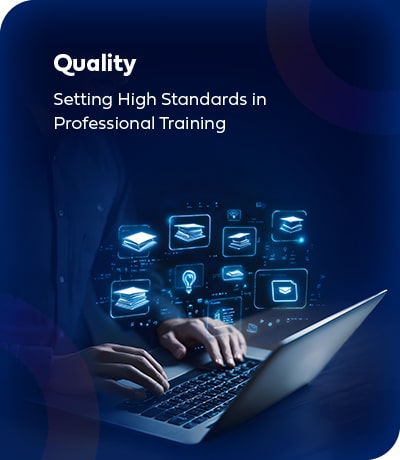
4.8 out of 5 based on 14,731 reviews

Online Course with Exam
Start learning immediately
855 Students enrolled
Price Match
Guarantee

3 months instalments of: £315.00
6 months instalments of: £157.50
9 months instalments of: £105.00
12 months instalments of: £78.75

By submitting this form, you agree to e-Careers processing your data in line with our Privacy Policy
The CompTIA Cybersecurity Analyst (CySA+) course is an internationally recognised, vendor-neutral certification that uses behavioural analytics to improve IT security by preventing, detecting, and combatting cybersecurity threats.
The CompTIA CySA+ course is ideal for IT and cyber security professionals keen to enhance their analytical skills. It's particularly beneficial for those involved in security operations or systems security and individuals responsible for managing and mitigating cyber threats.
This certification will set you apart in the competitive tech industry if you want to boost your credentials and advance in roles like IT Security Analyst, Cyber Security Specialist, or Vulnerability and Cyber Security Analyst.
Our CompTIA CySA+ certification equips you with the latest skills and knowledge to effectively identify and respond to security threats, manage vulnerabilities, and confidently ensure systems security. The curriculum will prepare you for the certification exam and apply practical, real-world solutions to secure your organisation's assets.
This certification sharpens your analytical skills, making you proficient in vulnerability management, security operations, and threat management. Whether you want to advance your career or validate your skills, this course offers the necessary comprehensive training.
The CompTIA CySA+ is a globally recognised credential testament to your cybersecurity and threat management expertise. CompTIA is the world's leading tech association, and they ensure that this certification reflects the most advanced and essential practices needed to combat the digital age's sophisticated threats.
With this certification, you can aspire to roles crucial in shaping organisations' security landscapes, including Incident Response Analyst, Cyber Security Analyst, Threat Analyst, and Security Engineer.
Why Choose Us
This online course offers a blend of self-paced learning and live sessions facilitated by industry experts. You will gain access to CompTIA-approved training materials, practical exercises, and live labs that ensure you not only pass but excel in the CompTIA CySA+ exam.
This course, in summary:
Online training and live sessions
Official CySA+ CS0-003 exam voucher included
12-month course access (you can complete it as quickly as you like)
CompTIA-approved CySA+ training materials
Live Labs Included
Tutor Support
Join us to become a confident Cybersecurity Analyst equipped to safeguard against digital threats and advance your career.
CompTIA CySA+ Modules
1.0 Security Operations
Explore critical security operations concepts, including system and network architecture, identity and access management, and data protection strategies. Learn to analyse indicators of potentially malicious activities using appropriate tools and techniques.
1.1 Explain the importance of system and network architecture concepts in security operations.
Understand the pivotal role of structured and secure architecture in enhancing overall security operations.
Log ingestion
Operating system (OS) concepts
Infrastructure concepts
Network architecture
Identity and access management
Encryption
Sensitive data protection
1.2 Given a scenario, analyse indicators of potentially malicious activity.
Learn to identify and assess signs of security threats through real-world scenarios, enhancing your threat analysis capabilities.
Network-related
Host-related
Application-related
Other
1.3 Given a scenario, use appropriate tools or techniques to determine malicious activity.
Gain hands-on information security experience with tools and methods crucial for pinpointing and confirming malicious activities in diverse IT environments.
Tools
Common techniques
Programming languages/scripting
1.4 Compare and contrast threat-intelligence and threat-hunting concepts.
Distinguish between proactive threat hunting and the use of threat intelligence to bolster an organisation's security posture against advanced persistent threats.
Threat actors
Tactics, techniques, and procedures (TTP)
Confidence levels
Collection methods and sources
Threat intelligence sharing
Threat hunting
1.5 Explain the importance of efficiency and process improvement in security operations.
Discover how streamlining processes and implementing efficient practices significantly enhance the operational efficiency of security measures and equivalent knowledge.
Standardise processes
Streamline operations
Technology and tool integration
Single pane of glass
2.0 Vulnerability Management
Gain skills in implementing and managing vulnerability scans, understanding various scanning methods, and analysing output from vulnerability assessment tools to prioritise and manage vulnerabilities effectively.
2.1 Given a scenario, implement vulnerability scanning methods and concepts.
Learn practical skills in conducting vulnerability scans and understanding different scanning methods and their applications in maintaining network security.
Asset discover
Special considerations
Internal vs. external scanning
Agent vs. agentless
Credentialed vs. non-credentialed
Passive vs. active
Static vs. dynamic
Critical infrastructure
Security baseline scanning
Industry frameworks
2.2 Given a scenario, analyse output from vulnerability assessment tools.
Master the analysis of vulnerability assessments to prioritise and manage security threats effectively.
Network scanning and mapping
Web application scanners
Vulnerability scanners
Debuggers
Multipurpose
Cloud infrastructure assessment tools
2.3 Given a scenario, analyse data to prioritise vulnerabilities.
Develop the ability to evaluate and rank vulnerabilities based on their potential impact, streamlining the mitigation process.
Common Vulnerability Scoring System (CVSS) interpretation
Validation
Context awareness
Exploitability/weaponisation
Asset value
Zero-day
2.4 Given a scenario, recommend controls to mitigate attacks and software vulnerabilities.
Propose effective security controls and strategies to protect against identified vulnerabilities and minimise risk.
Cross-site scripting
Overflow vulnerabilities
Data poisoning
Broken access control
Cryptographic failures
Injection flaws
Cross-site request forgery
Directory traversal
Insecure design
Security misconfiguration
End-of-life or outdated component
Identification and authentication failures
Server-side request forgery
Remote code execution
Privilege escalation
Local file inclusion (LFI)/remote file inclusion (RFI)
2.5 Explain concepts related to vulnerability response, handling, and management.
Understand the comprehensive approach required for effective vulnerability management, from response strategies to ongoing management practices, aligning with continuous security monitoring.
Compensating control
Control types
Patching and configuration management
Maintenance windows
Exceptions
Risk management principles
Policies, governance, and service level objectives (SLOs)
Prioritisation and escalation
Attack surface management
Secure coding best practices
Secure software development life cycle (SDLC)
Threat modelling
3.0 Incident Response and Management
Develop proficiency in incident response, from understanding attack methodologies to performing specific incident response activities. Learn to manage the incident lifecycle, including preparation, detection, containment, eradication, and post-incident activities.
3.1 Explain concepts related to attack methodology frameworks.
Learn about various attack frameworks and their relevance in formulating effective incident response strategies against advanced persistent threats.
Cyber kill chains
Diamond Model of Intrusion Analysis
MITRE ATT&CK
Open Source Security Testing Methodology Manual (OSS TMM)
OWASP Testing Guide
3.2 Given a scenario, perform incident response activities.
Use practical exercises to efficiently and effectively mitigate security incidents, incorporating continuous security monitoring and event management.
Detection and analysis
Containment, eradication, and recovery
3.3 Explain the incident management life cycle's preparation and post-incident activity phases.
Gain insights into the critical phases of incident management, from preparation to recovery and post-incident analysis, ensuring a robust event management strategy.
Preparation
Post-incident activity
4.0 Reporting and Communication
Master the skills of reporting and communication essential for security solutions management. This module teaches you to effectively articulate incident response outcomes and vulnerability management to stakeholders, emphasising the role of network access control in securing data.
4.1 Explain the importance of vulnerability management reporting and communication.
Understand the significance of clear and effective communication in vulnerability management, ensuring all stakeholders are informed and aligned.
Vulnerability management reporting
Compliance reports
Action plans
Inhibitors to remediation
Metrics and key performance indicators (KPIs)
Stakeholder identification and communication
4.2 Explain the importance of incident response reporting and communication.
Learn how to effectively report and communicate incident response activities and outcomes to ensure transparency and accountability in security operations.
Stakeholder identification and communication
Incident declaration and escalation
Incident response reporting
Communications
Root cause analysis
Lessons learned
Metrics and KPIs
CompTIA CySA+ CS0-003 Exam Details
The CySA+ exam verifies the successful candidate has the knowledge and skills required to apply threat detection techniques, perform data analysis, and interpret the results to identify vulnerabilities, threats, and risks to an organisation with the end goal of securing and protecting applications and systems within an organisation.
Number of questions: Maximum of 85 questions
Types of questions: Multiple-choice and performance-based questions
Length of test: 165 minutes
Passing score: 750 (on a scale of 100-900)
*Please note that CompTIA certification exams, policies and procedures are subject to change, so please check the official CompTIA website for the most current information before your exam.
While there are no strict prerequisites, hands-on experience in information security or related fields is recommended. You must also be familiar with security concepts and technologies, including identity and access management, incident response, and vulnerability management.
The CompTIA CySA+ certification serves as a bridge for IT professionals who possess foundational skills and aim to specialise in cybersecurity. It builds upon basic knowledge and prepares professionals for a career explicitly focused on security analysis, helping them develop critical assets within their organisations capable of responding to the ever-changing landscape of security threats.
For those new to the IT field and interested in pursuing the CompTIA CySA+ certification, it is advisable to begin with foundational courses. We recommend starting with the CompTIA A+, CompTIA Network+, and CompTIA Security+ certifications. These courses will provide the IT fundamentals, networking, and essential security background, preparing you for the more advanced topics covered in the CySA+ certification.
When you choose to pursue your CompTIA CySA certification with e-Careers, you're not just signing up for a course; you're investing in a comprehensive learning experience designed to bolster your career in cybersecurity.
Here's how enrolling with us can benefit you:
Expert-Led Training
Industry professionals with years of experience in security operations and cybersecurity training lead each course session. Our instructor-led training provides an interactive learning environment where you can get real-time feedback and answers to your questions, ensuring you grasp complex concepts effectively.
Practical, Hands-On Skills Development
At e-Careers, we emphasise developing hands-on skills directly applicable in the workplace. Through our live labs and simulations, you'll practice the latest threat detection and response techniques, preparing you to handle real-world security challenges efficiently as a CompTIA cybersecurity analyst.
Comprehensive Course Materials
You will receive various resources to enhance learning and ensure readiness for the CompTIA CySA+ exam. From detailed study guides to practice tests, our course materials are tailored to complement the instructor-led sessions and provide an in-depth understanding of all topics covered.
Flexible Learning Options
We understand that our students have different learning preferences and schedules. That's why we offer flexible learning options that allow you to engage with the content at your own pace. Whether you prefer to study in a structured classroom environment or through self-paced online materials, we have solutions that fit your needs.
Enrol with Confidence at e-Careers
Choosing e-Careers means learning from a reliable and trusted provider backed by 14,000 glowing reviews on Trustpilot. Our commitment to quality education ensures you receive top-notch training and support throughout your course.
Is CompTIA cybersecurity analyst worth it?
Yes, the CompTIA Cybersecurity Analyst (CySA+) certification is worth it for several reasons, especially if you're pursuing a career in cybersecurity. Here's why the CySA+ certification can be a valuable addition to your professional credentials:
1. Industry Recognition: CompTIA is a globally recognised organisation, and its CySA+ certification is highly respected in the IT and cybersecurity fields. This certification demonstrates that you possess relevant and up-to-date cybersecurity skills.
2. Enhanced Job Prospects: Earning a CySA+ certification can open doors to various roles within cybersecurity, including cybersecurity analyst, security operations centre (SOC) analyst, and vulnerability analyst. It serves as a baseline qualification that many employers look for.
3. Skill Development: The CompTIA CySA+ certification covers essential areas such as threat management, vulnerability management, and incident response, providing a solid foundation for any cybersecurity professional.
4. Better Earning Potential: Certified professionals often command higher salaries than their non-certified peers, reflecting the value and expertise that certifications like the CySA+ bring.
5. Compliance with Standards: The CompTIA CySA+ certification aligns with ISO 17024 standards, ensuring its recognition internationally, including in the UK.
6. Preparation for Advanced Roles: It provides foundational knowledge for pursuing advanced cybersecurity certifications and roles.
Is CySA+ better than Security+?
Yes, the CompTIA CySA+ (Cybersecurity Analyst) certification is considered a step above CompTIA Security+ in complexity and specialisation.
While Security+ is a foundational certification covering general security concepts and best practices, CySA+ is more advanced and focuses specifically on cybersecurity roles. It delves deeper into cybersecurity analytics, intrusion detection, and response management.
Professionals often pursue Security+ to better understand security concepts before moving on to more specialised certifications like CySA+. This preparation prepares them for specific roles like cybersecurity analysts, incident responders, and threat intelligence analysts. This progression reflects an increase in the depth of knowledge and the technical skills required.
If you want to learn more about which course is ideal for your goals and needs, you can contact us at +44 (0) 20 3198 7700 or message us here, and we'll get back to you.
What jobs can I apply for after my CySA training?
After completing your CompTIA Cybersecurity Analyst (CySA+) training, you can apply for several key cybersecurity roles requiring a blend of analytical and technical skills. Here are some of the roles that would be suitable:
1. Cybersecurity Analyst: This role protects an organisation's computer systems and networks by monitoring, detecting, investigating, analysing, and responding to security incidents.
2. Security Operations Center (SOC) Analyst: SOC analysts work within a team to continuously monitor and counteract threats to an organisation's IT infrastructure.
3. Vulnerability Analyst: This role focuses on identifying, analysing, and reporting vulnerabilities in systems that cyber attackers could exploit.
4. Incident Response Analyst: Specialists in this role manage the response to cyber breaches and security incidents, ensuring quick restoration and recovery.
5. Threat Intelligence Analyst: These analysts focus on understanding and predicting the capabilities and intentions of cyber criminals to prevent attacks before they occur.
6. Compliance Analyst: This role involves ensuring that an organisation's practices comply with regulatory requirements and standards, helping to manage risks and maintain the integrity of data and systems.
7. Security Engineer: Security engineers design and implement secure network solutions to defend against advanced cyber threats and security breaches.
What is CompTIA Cybersecurity Analyst (CySA+)?
The CompTIA Cybersecurity Analyst (CySA+) certification is a globally recognized certification designed for cybersecurity professionals focused on identifying and addressing cybersecurity threats. CySA+ bridges the gap between entry-level security certifications (like CompTIA Security+) and advanced certifications by equipping you with skills to detect, analyze, and respond to cybersecurity incidents.
To become a cyber security analyst, you typically need a combination of skills and relevant certifications. Here's a breakdown of the typical qualifications:
Certifications
CompTIA Security+: A foundational certification that covers essential security concepts and best practices.
CompTIA CySA+ (Cybersecurity Analyst): Focuses on behavioural analytics to improve IT security by detecting and combating cybersecurity threats.
Certified Ethical Hacker (CEH): Provides a solid foundation in ethical hacking techniques and the tools used by malicious hackers.
Check out the cyber security courses that you can take with e-Careers.







